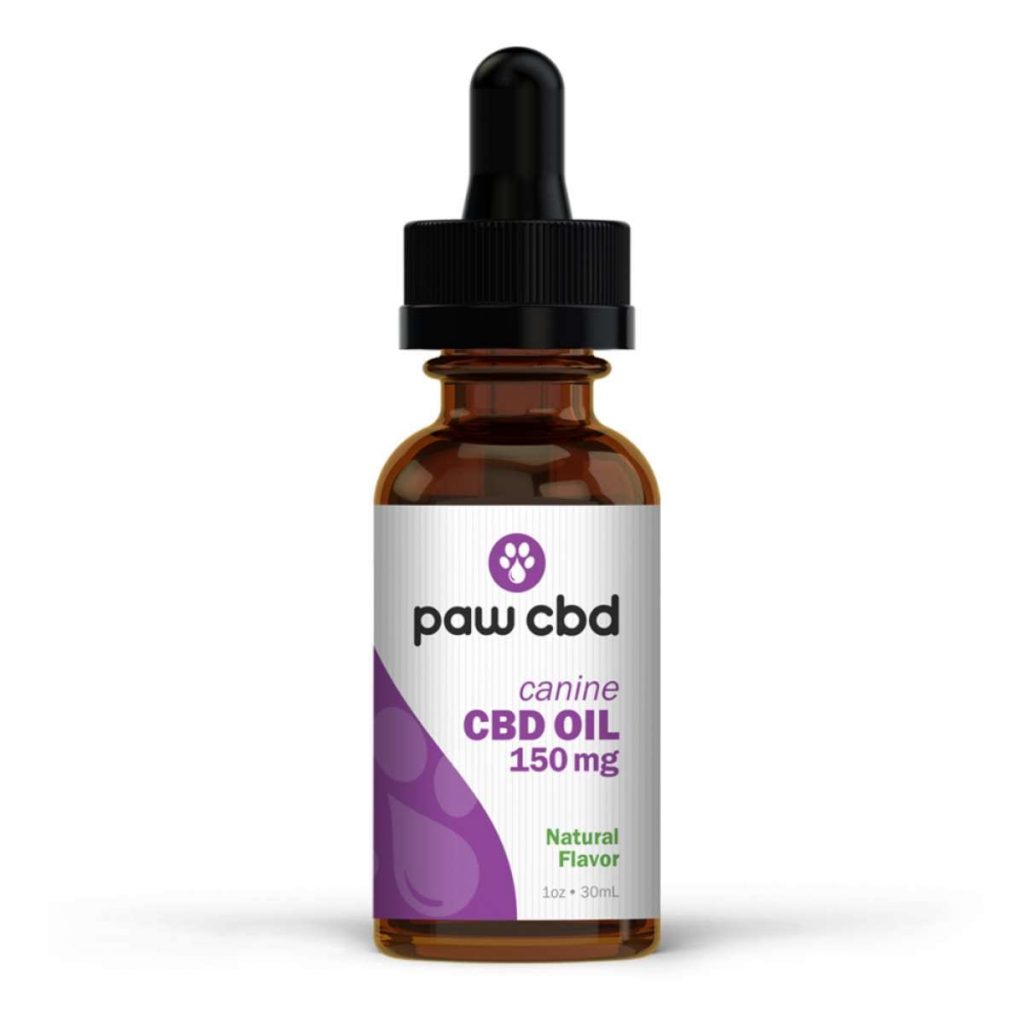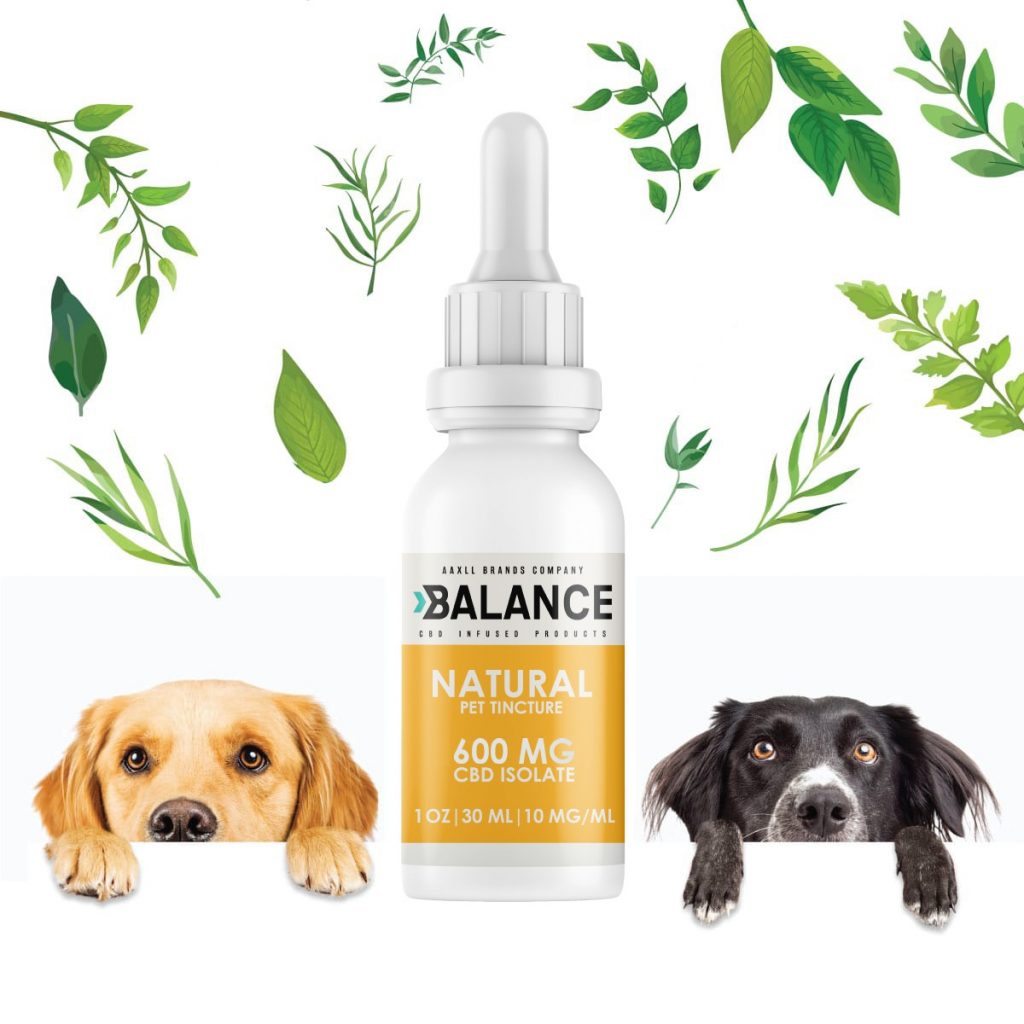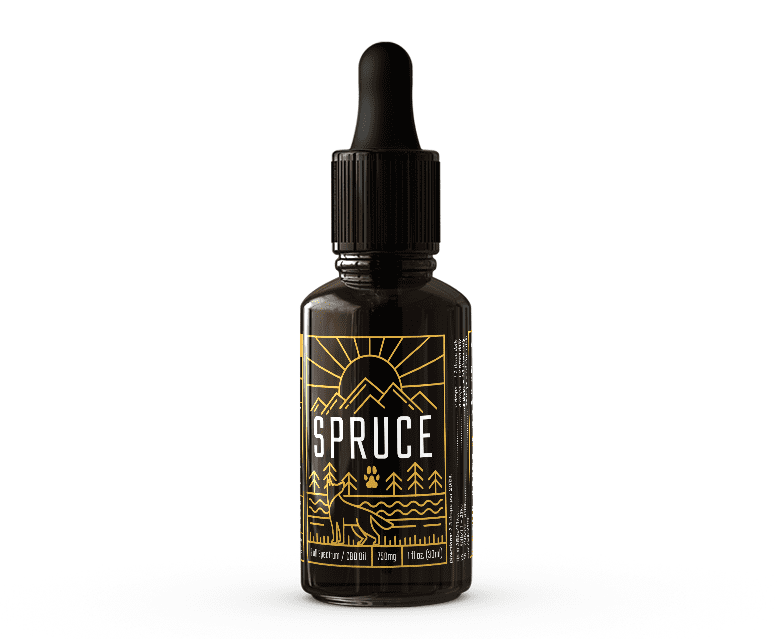CBD For Dog Allergies What Are the Goods of CBD on Dogs With Allergies?
- Dog keepers and doctors are using CBD as an alternative treatment as dog allergies thankfulness to its personal relationship with the endocannabinoid system, which all mammals have(1).
- CBD is understood to possess anti-inflammatory properties which will help alleviate the swelling, pain, and discomfort that comes with dermatitis or skin allergies(2).
- Research on various animals from mice and rats to dogs has shown promising leads to CBD’s anti-inflammatory effects(3).
- One significant study administered CBD on dogs with atopic eczema and yielded positive results(4).
- Still, CBD is by no means a cure for dog allergies. Pet owners should seek the recommendation of veterinarians before administering CBD oil to their dogs.
Best CBD Oils for Dogs Allergies
cbdMD Pet CBD Oil Tincture for Dogs

Powerful CBD oil for your canine friends
Summary
With nothing but MCT oil combined with CBD oil sourced from U.S. hemp that’s grown using organic farming methods, these CBD Oil Tinctures for Dogs are often added to their favorite foods while still providing equivalent effects that you simply enjoy. we’ve two flavors to settle on from Natural and spread.
Pros
- CBD Oil benefits humans and pet and animal
- No products THC Animal-specific (dogs, cats, horses)
- manufactured of premium CBD from non-GMO USA hemp
Cons - Low-lying terpene and cannabinoid form
Balance CBD

Our Balance CBD Oil for Dogs is formulated specifically with our furry friends in mind. Now your pet can enjoy all the advantages CBD has got to offer during this convenient, travel-sized dropper bottle. It comes in 3 flavors; natural, salmon, and cod liver. The Salmon Flavor Pet Tincture may be great for cats, dogs, and lots of other four-legged friends, just ask your veterinarian first! Special delicious oil can simply be added to your pet’s food, treats, or direct into their mouth, offering fast-acting relief from the daily difficulties of a pet’s life.
Spruce Dog CBD Oil 750mg

Spruce’s dog-friendly CBD has done specially formulated for dogs. First, then hemp seed oil for the carrier oil, the merchandise contains copra oil, which is usually easier on the digestion for dogs. The taste is additionally milder with no flavorings, making it more likely that dogs will eat it with their food.
Using Spruce CBD for dogs is honest. All owners need to do is sprinkle the specified dose on the dog’s food at mealtime once or twice each day. Each dose should contain about two to 3 drops per 20 pounds of dog weight.
Nuleaf Naturals

For dogs, cats, and another four-legged friends! Our product is concentrated to approximately 50mg cannabinoids per millilitre of oil. While this product is meant for pets, it’s great for humans, too.
Why Dog Owners Are Turning to CBD Oil for Dogs
Various studies have shown which will cannabinoids like CBD possess anti-inflammatory properties that can help alleviate allergies in both animals and humans(5).
Because of this, dog owners are turning to CBD oil as an alternate treatment for his or her pet dogs’ allergies.
Like humans, animals like dogs experience allergies throughout their lives(6).
Others even claim that certain dog breeds, like golden retrievers and German shepherds, are more vulnerable to developing skin allergies.
If not treated early or diagnosed at a later time, these allergies can produce severe health ailments(7).
Dog allergies can manifest in several ways, from hives and rashes to several sorts of dermatitis.
The most common sorts of dog allergies are atopy (early allergic reaction), flea allergy dermatitis, allergy, and drug intolerance(8).
Various external factors can cause allergies in dogs. These allergens can originate from either the environment or from animals like insects themselves.
However, chemical compounds and particular food also can contribute to the event of skin problems in furry animals.
Common environmental allergens include dust and pollen, which are most current during springtime and should trigger seasonal allergies in dogs.
Environmental allergens also can cause skin conditions like allergic dermatitis, one among the foremost common sorts of dog allergies affecting even cats(9).
Allergic dermatitis or atopic eczema occurs when a pooch is exposed to environmental allergens, causing the dog’s system to release an inflammatory response.
On the opposite hand, pests, like dust mites and fleas, also frequently plague dogs. Their bites can cause acute moist dermatitis or hot spots in dogs’ skin.
These hot spots are characterized by patches of red, infected, and inflamed itchy skin.
Hot spots are usually self-inflicted by the furry animals themselves as a response to the itchiness and irritation caused by dust mite bites and flea bites(10).
Yet another quite common dog allergy is dermatitis. Dermatitis occurs when a dog interacts with irritating substances like chemicals, leading to inflammatory responses that affect the dog’s skin(11).
The dog’s system is liable for these inflammatory actions because it produces a surplus of antibodies as a natural reaction to injuries and infections.
When the dogs are exposed to allergens, this very action is triggered, and chronic allergic inflammation develops(12).
Various studies found cannabidiol, or CBD, to possess anti-inflammatory effects thanks to its relationship with the endocannabinoid system (ECS)(13).
In particular, CBD can help inhibit the consequences of allergies by reducing the antibodies that trigger the immune system’s inflammatory responses(14).
Research uncovered that the ECS is present altogether in mammalian life, from humans to mice and even dogs(15).
The ECS is liable for regulating various bodily processes like sleep, memory, mood, pain, and, most significantly, immune function(16).
Researchers from The Hebrew University of Jerusalem suggest that cannabinoids (chemical compounds found within the cannabis plant) may help inhibit allergic skin diseases in humans(17).
In fact, one significant study examined the consequences of cannabinoids on dogs with atopic dermatitis(18).
Initially, the researchers were investigating the distribution of CB1 and CB2 receptors in dogs’ skin.
CB1 plus CB2 do cannabinoid receptors including this ECS. When these receptors bind with cannabinoids like CBD, therapeutic effects like anti-inflammatory and pain-relieving actions are activated.
The research subjects were five dogs with healthy skin and five dogs afflicted with atopic eczema.
The researchers found that cannabinoid compounds were ready to protect the dogs against allergic inflammatory skin conditions.
They concluded that there was potential in targeting the ECS when treating inflammatory disorders like dog allergies.
Another study investigated the potential pain-relieving effects of CBD on dogs affected by osteoarthritis(19).
Osteoarthritis occurs when the cartilage deteriorates, resulting in joint inflammation.
Like allergies, the system attacks the tissues around the joints, mistaking it as a harmful entity. This response leads to inflammation, causing joint pain in dogs.
The study found that CBD was an efficient pain reliever for dogs because the subjects became easier and active.
However, there was no evidence to suggest that CBD was ready to reduce joint inflammation.
Nevertheless, evidence supports CBD as an efficient pain reliever for dogs. It thus has the potential to ease the pain and discomfort that sometimes accompany inflammatory allergies.
Another research discovered that CBD treatment reduced airway inflammation and connective tissue formation in mice with allergic asthma(20).
One major characteristic of asthma is chronic lung inflammation.
Still, research examining the consequences of CBD on dogs’ allergies are limited in scope and number.
Nevertheless, a growing number of pet owners and veterinarians are advocating for the utilization of CBD and other cannabinoid products as a treatment for animals(22).
However, multiple studies identify CBD’s inflammatory effects on both human and animal subjects like mice and rats.
Keep in mind that CBD isn’t a miracle cure for any skin conditions a pooch may have. Yet, administering CBD to dogs may help reduce allergy symptoms like sneezing, itchiness, hair loss, and discomfort.
How CBD Oil Works to assist Dogs
The anti-inflammatory effects of CBD are often attributed to its relationship with the endocannabinoid system (ECS), which is additionally present in dogs.
The ECS may be a signaling system that plays an important role within the regulation of bodily processes like sleep, mood, memory, pain, and immune function(23).
The ECS consists of cannabinoid receptors, endocannabinoids, and enzymes liable for its synthesis and breakdown.
CB1 and CB2. There remain two main cannabinoid receptors; While CB1 receptors are found most usually within the brain and systema nervosum, CB2 receptors are placed inside the system.
Endocannabinoids act neurotransmitters. They function as signals, and once they bind to cannabinoid receptors like CB1 and CB2, they activate specific actions.
A study cites the relevance of CB2 in inhibiting inflammation within the body by limiting the signals that trigger an immune response(24).
Endocannabinoids also are called endogenous cannabinoids because they’re found within the body.
Cannabinoids also exist in plants, the foremost popular samples of which include cannabidiol (CBD) and tetrahydrocannabinol (THC).
Both CBD and THC are phytocannabinoids (phyto, meaning from a plant) found within the marijuana plant.
Unlike THC, CBD doesn’t have psychoactive properties that induce a euphoric “high” during a user.
CBD comes from the hemp plant, one among the sorts of the Cannabis plant. Hemp plants or Industrial hemp contain but 0.3% of THC.
CBD works within the same manner as endocannabinoids within the body do.
When CBD binds with cannabinoid receptors, its therapeutic effects are activated, allowing its anti-inflammatory properties(25).
The Pros and Cons of CBD oil for Dogs
Pros
- CBD use on both animals and humans features a good safety record with no notable adverse side effects(26).
- Dogs are known to share similar conditions with humans also as rats. they’re often utilized as models for studying diseases afflicting the species, as mentioned earlier(27).
- Researchers administered CBD to dog subjects orally for over 12 weeks and located CBD to be safe for healthy adult dogs(28).
- Another study administered a month-long treatment involving high concentrations of CBD on dogs yielded no notable adverse effects(29).
- A 2018 research examining the consequences of CBD administration to 30 healthy dogs also reported a scarcity of adverse side effects. The researchers concluded that the dogs tolerated CBD well(30).
- Dogs cannot naturally produce essential fatty acids like omega-6 and omega-3, which is why it’s beneficial for them to consume these fatty acids(31).
- Omega-6 and omega-3 are known to manage vital signs and inflammatory responses(32).
Terpenes, another active ingredient found in Full-spectrum CBD, was shown to decrease allergy symptoms in rat subjects(33). - CBD products. like tinctures, sprays, and topical balms, creams, and salves, are easy to use in dogs with allergies. These leave targeted application on the specified area of the skin.
- CBD products for dogs also are plentiful, with various CBD brands offering all types of products with distinct application methods.
Cons
- CBD interacts negatively with other drugs taken alongside it. an equivalent reaction may happen CBD is run to dogs(34).
- Dogs, humans, rats, mice, and chimpanzees only share around 76% to 82% similarity in CB2 receptors, which are crucial to CBD’s anti-inflammatory properties. Previous studies identified dogs as ideal models in studying medical conditions almost like humans.
- However, individuals must remain cautious as CBD may yield differing pharmacological results thanks to differences in species(35).
- THC is taken into account toxic to dogs(36), although the lethal oral dose for dogs is quite 3 grams per kilogram(37). Pet owners should check if the CBD product they decide to or are using on pooches contains THC. THC, like CBD, is another cannabinoid derived from the cannabis plant.
- The FDA (Food and Drug Administration) has yet to approve CBD use on animals(38). Pet owners must first consult a veterinarian before administering CBD to pet dogs.
- Although studies administering CBD on dogs have shown a scarcity of adverse reactions, some side effects may include diarrhea (39), dry mouth, low vital sign, and drowsiness(40).
How CBD Oil Compares to Alternative Treatments for Dogs with Allergies
At present, no studies back CBD as an antihistamine (drugs used for allergies).
Common over the counter antihistamines for dogs includes Benadryl and Claritin. In contrast, other dog owners choose natural remedies, like copra oil.
To add, CBD is by no means a cure for dog allergies.
However, cannabinoids like CBD and their relationship with the ECS have great potential as alternative allergy treatment strategies for both dogs and humans.
PEA has shown potential in inhibiting symptoms of inflammatory skin diseases in both humans and animals.
Specifically, the study used canine mast cells (cells rich in histamine and a part of the immune system).
How to Choose the best CBD Oil for Dogs
Dog owners must choose only high-quality CBD products for his or her pets affected by allergies.
Consider the subsequent when choosing the best CBD oil for the furry animals:
CBD products are labeled as either full-spectrum CBD, broad-spectrum, or CBD isolate. Full-spectrum CBD is suggested for dogs with allergies since it contains the bulk of active cannabinoids and natural ingredients found within the hemp plant. As mentioned earlier, full-spectrum CBD includes terpenes, which has been shown to inhibit allergies in rat subjects. It also has flavonoids and hemp oil, which houses fatty acids like Omega-3 and Omega-6. of these ingredients combine to offer the user its famous “entourage effect”.
Check the legal provisions on the utilization of CBD products within the state that it’ll be purchased from and used. Note that the 2018 bill has made industrial hemp legal, meaning that each one product derived from it, from hemp seed oil to hemp CBD, should contain but 0.3% THC.
For max effectiveness and therefore the safety of dogs’ skin health, buy organic and non-GMO CBD products.
Pet owners should also research if the product’s manufacturer extracted the CBD oil using CO2 technology. This method is currently the safest and cleanest thanks to extracting all the natural ingredients from the hemp plant, so it indicates top quality.
CBD Dosage for Dogs
There is yet to be a uniform CBD dosage guide or chart for dogs.
Keep in mind that the FDA has not yet approved CBD for animals, meaning that the majority of the available CBD dosage information is anecdotal.
However, there’s a standard consensus that dosage should depend upon the dogs’ weight and the way severe its skin problems are.
Pet owners should follow the manufacturer’s instructions regarding CBD dosage for pooches.
Dogs are smaller than humans and need a special dose than their owners.
It is still highly recommended to consult a veterinarian before administering CBD as a treatment to dogs’ allergies.
How Dogs with Allergies Can Take CBD Oil
Due to CBD’s popularity within us, various CBD products for dogs with allergies now exist.
The most popular CBD dog products are tinctures, which can are available syringes, spray, or marked droppers.
These products are easy to administer as dog owners may apply it sublingually (under the tongue), or spray onto the recent spots or desired area of the skin.
Pet owners may mix CBD oil with the pooch’s food and water, as several flavored CBD products exist on the market.
Topical CBD products also are convenient to be used CBD creams, hemp oil, salves, and balms on dogs with skin problems.
Dog owners may simply administer these on the affected areas of the skin.
Most CBD brands recommend the administration of twice each day for max effectiveness.
Conclusion
Cannabinoids like CBD possess anti-inflammatory properties which will help alleviate the swelling, pain, discomfort, and itchiness experienced by dogs with allergies. As such, various pet owners and veterinarians are turning to CBD as a possible Alternative treatment for dog allergies.
Still, dog owners must first consult a veterinarian before administering CBD to their pet animals.
CBD isn’t a cure for dog allergies. However, it’s shown promise in alleviating the unwanted symptoms that accompany these medical conditions. It thus may give pet dogs comfort and general well-being.








